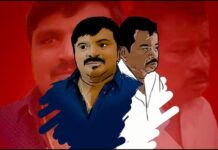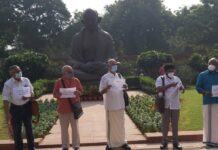/ Jignesh Mewani /
Today marks the first death anniversary of Gauri Lankesh. Gauri was killed by (then) unidentified gunmen who shot four bullets at her. They killed Gauri because they disagreed with her politics. Gauri’s murder has been the fourth in the series of murders where regional language writer-rationalists including Narendra Dabholkar, M.M. Kalburgi and Govind Pansare were killed in broad daylight. The earlier murders remain largely unsolved, even as the investigation into Gauri’s murder is ongoing. While recent forensic reports suggest who the killers of Gauri are, the larger public who creates such an environment of hate in which someone can so easily murder you because you disagree with their ideas and politics are far more difficult to identify, as we saw in the case of the attempted killing of Umar Khalid.
It still feels like yesterday that I first met Gauri in 2016, after the success of our “Chalo Una” struggle in Gujarat. Chalo Una was held to protest the flogging of Dalit men against the false charges of cow slaughter. It was my first attempt at organising people in such big numbers. It was a march for dignity for our Dalit brothers and sisters. I dreamed of ensuring that they would vow never to dispose of dead cattle. We demanded that the government give us land so that we can be self-sufficient and lead a life of dignity. During the same time, similar struggles for asserting rights to land and shelter were on in Karnataka. Gauri along with comrades from Karnataka wanted to organise a protest march along similar lines in Udupi, against the upsurge of violence on Dalits and Muslims. After the success of Chalo Udupi, I held a series of protest rallies against the atrocities on Dalits and minorities, aided by her solidarity.
I believe that the best relationships are formed in times of resistance. Before August 2016, I did not know Gauri Lankesh, but within a span of one year, she became my comrade, my friend and my mother. Gauri was all these things and more. Gauri was a fighter: she fought for the oppressed, for women rights, Dalits and against the communal forces in Karnataka for many years and that made her a nemesis to many extremists groups. Gauri was fierce, outspoken yet kind. Even to the most vile criticism and trolling, she would be kind and engage in dialogue. She believed in the power of the youth, whom she saw as our best hope in times when all voices of dissent are being silenced. In today’s time, when there is a general dismissal of young people as “internet-centric millennials”, “uninspired” or “lazy armchair activists”, Gauri had faith in this young generation and the fresh approach and ideas they bring to the movement.
Gauri Lankesh was a journalist, an activist and a mother to many activists like me. She had adopted many of us younger dissenters as children and I am grateful to be part of the Gauri Lankesh fraternity. Even before I met her, she had made me her son, sharing my speeches and proudly saying “Listen to ‘nanna koosu’ (my baby)”. She was my Kannada mother, coming to pick me up at midnight from the airport, strictly instructing organisers that I will be staying at her place. Because of Gauri, Karnataka has become a second home to me. I have got so much support and love from the people of Karnataka. Many progressive groups and supporters from Karnataka came to campaign for me before the Gujarat elections, and honestly, my journey from a social activist to an MLA would not be complete without the support of these people. These are the kind of alliances that Gauri helped build, she knew that to fight against caste, class and communalism we needed a coming together of like-minded groups on a common platform. She worked towards making this a reality in Karnataka and across the country, and this was also among one of the reasons that she was a target.
Gauri was the editor of Gauri Lankesh Patrike, a Kannada fortnightly. In the times of fake news and sold out media, Gauri painstakingly ran a newspaper in the local language without any advertisement revenue, and while the champagne-sipping urban elite talk of dissent in only English-speaking exclusive panels, Gauri was a staunch critic of right-wing Hindutva politics in a local language. This made her reach out in truly Marxist, Ambedkarite and grassroots ways. The newspaper provided space for progressive voices in the rapidly diminishing democratic space in the media.
In the last one year, not just mine, but the lives of ordinary Indians has also changed. The struggle that started with the slogan of “Food is our choice, land is our right” is stronger than ever and so is the state repression. We are not living in India, we are living in ‘Modi-fied India’, where there is no space for dissent. We are living in toxic times where the violence that once shook us has become normalised and a Kalburgi has been followed by a Gauri, a Gauri followed by a Shujaat, a Shujaat followed by who knows who it might be next.
We are at a stage when mob lynchings have become normal and even acts of murders of Muslims in videos, like that of Afrazul, do not elicit much shock anymore. No measures have been taken on lynchings despite Supreme Court orders. The developments of the last few years are nothing short of an undeclared Emergency, possibly more insidious than an explicitly open one. The fascist forces want to keep us busy fighting the fake narratives, sometimes in the name of beef, sometimes over grotesque phrases like “love jihad”, then “anti-national” and now “urban Naxals”. While we fight to reclaim or quash the weight of these words, Prime Minister Narendra Modi helps Adani and Ambani get richer and help other fraudsters of the Mallya and Nirav ilk escape sans accountability. That their policies haven’t delivered evidently shows how the government is panicking and concocting stories to polarise public opinion.
Today, as I write this, homes of several human rights lawyers and activists, many of Gauri’s own comrades, have been raided and have been arrested as ‘part of the probe into violence at Bhima-Koregaon’ under ambiguous charges, media uncritically lapping up the stories and already declaring people as “urban Naxals” in televised trials. The government is targeting lawyers who are fighting for Adivasis and against land grabs by the multinationals, all this while protecting the people who gave inflammatory speeches at Bhima-Koregaon and were the real instigators of the riots. Sambhaji Bhide and Milind Ekbote, chief instigators of violence against Dalits havent yet been arrested despite an apex court order.
When Gauri was killed last year, many were asking, “Who’s next”? We have seen who is next. They came for Gauri, then they came for Umar. They came for Saibaba, for Dalit activists like Sudhir Dhawale and now even non-Dalit human rights defenders like Sudha Bharadwaj. They used to justify the murders of Muslims earlier by staging encounters on the premise that every Muslim was a terrorist, now every Muslim is viewed in suspicion for carrying beef. They shielded a rape accused, but came forward to blame the victims, talked of social media presence but quelled mainstream media’s questioning. How long till they come for all of us?
But we cannot live in fear. We are not alone. We who choose to fight for justice are inevitably fighting for the people and thus, people are with us. They can kill us but they cannot kill our ideas. Gauri lives in all of us. We are all Gauri.
Rest In Power Gauri Amma!



























